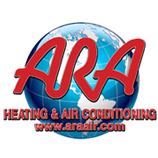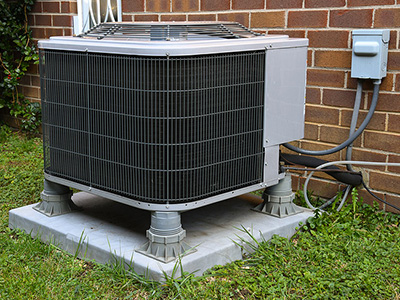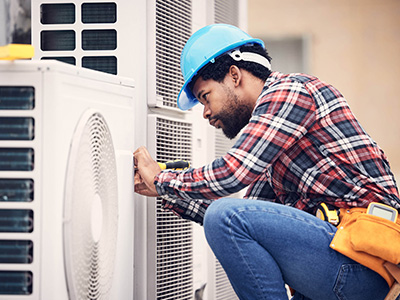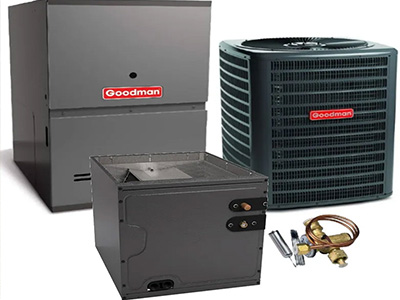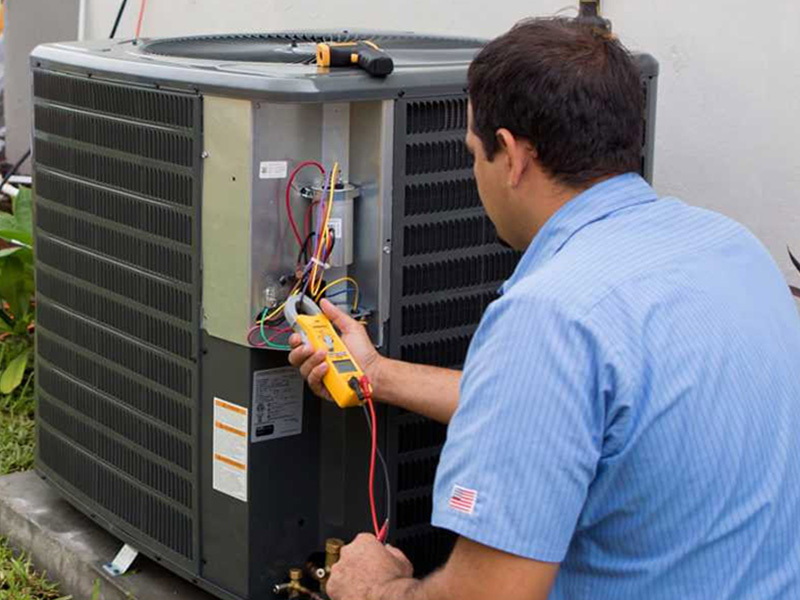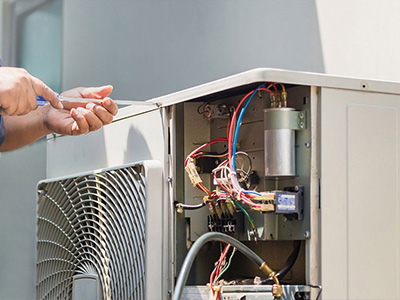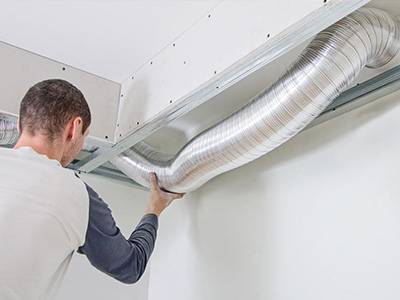

FAQs
You will find our Frequently Asked Questions (FAQs) for Heating, Air Conditioning, and for Indoor Air Quality below.
Heating and AC Frequently Asked Questions
Yes we do offer financing! To apply, please click here and fill out the online application.
The thermostat senses that the room temperature is cooler than the set temperature and signals the furnace to come on. Inside the furnace a small exhaust vent blower comes on to force the unused vent gas out the flue. This in turn allows gas and air into the "heat exchanger" to be ignited by a glow bar. When the gas begins to burn it heats up the metal "heat exchanger". The furnace blower then comes on and blows the air warmed by the heat exchanger into the room thru your duct system and registers. Ultimately, you and your family feel warmer.
In most cases the answer is NO, you won't need as large an input furnace. With today's furnaces obtaining 80% to 95% in efficiency you just don't need as large a furnace. The old inefficient furnaces were wasting almost half of their heat up the flue vent to the outside and not into your home. We can help you in deciding what system is right for your home.
When your furnace or air conditioner starts giving you more problems and the problems are not cost effective to repair, particularly when major components such as the compressor start making unusual noises or otherwise indicating need for service. Because newer equipment is more energy efficient, the money you save in reduced utility costs, might pay back your purchase price of a new system years earlier than you might think.
Heating and AC (HVAC) systems should be serviced once per year. It is best to have the furnace or boiler tuned-up in the fall and AC in the spring before heavy use occurs. Call ARA to have your system tuned up properly.
Servicing your Heat and AC (HVAC) systems annually: increases dependability; locates any problems; allows the unit to perform at its maximum efficiency, therefore lowering energy costs, prolonging the lifespan of the unit, and ensuring that the unit is operating safely and healthily.
It is recommended you change your filter every thirty days for best performance. This can vary dependant on your furnace and filter model.
Very important! If you get a system that is too big, it may heat or cool your home too fast and you won't feel comfortable. The thermostat temperature will be satisfied before you are. During the cooling process, humidity won't sufficiently be removed from the air causing you to feel sticky, and it could even lead to problems with mold in your home. Short starts and stops will also shorten the life of your system and raise utility bills.
If the unit is too small it won't be able to get the job done in your home, this is especially true during colder weather. The systems will have to run constantly again raising utility cost and reducing the life of the system.
It is best to have an ARA Home Comfort professional visit your home and take exact measurements to better inform you which system will work best for you and your home.
Indoor Air Quality Frequently Asked Questions
According to the Environmental Protection Agency (EPA), your exposure to air pollutants can be up to 100 times higher indoors than outdoors. The American Lung Association estimates that most people spend 90% of their time indoors, so clean indoor air is very important.
There are several everyday steps you can take to reduce the pollutants circulating in your home, including:
- Store household cleaners, paint solvents and chemical products in tightly sealed containers. If possible, keep them outdoors.
- Clean and vacuum at least once a week.
- Regularly wash bed linens and stuffed toys.
- Keep windows closed when pollen, pollution and humidity levels are high.
- Make sure your home is properly ventilated. (Modern homes are well insulated and sealed to conserve energy, which means airborne pollutants have no way to escape).
- Keep humidity levels within a healthy, comfortable range to prevent growth of mold and mildew (25% - 55%).
- Avoid using scented deodorizers and odor-masking air fresheners, which may cause toxic chemicals.
- Have your HVAC system regularly inspected to make sure it is clean and in good operating condition.
- Choose furnishings that emit the smallest possible amount of chemical vapors.
- Do not allow smoking inside your home and make sure all gas appliances are properly vented.
Many household items contribute to poor indoor air quality. Compounds found in carpeting, furniture, upholstery and drapery fabric consistently emit gas or fumes. Other sources of pollutants can include, but are not limited to, cleaning agents, paints and personal care products. Newer homes that are tightly sealed for energy efficiency tend to limit air circulation, which can contribute to a buildup of contaminants.
Allergies and asthma are two health problems that can be helped with clean indoor air. When airborne irritants are removed, allergy and asthma sufferers often find relief from their symptoms. Even healthy people who have never suffered from allergies can benefit from clean air. By removing airborne dust particles, you reduce the amount of exposure your respiratory system has to them.
Poor indoor air quality can be the cause of numerous health problems. Medical groups report that as many as half of all illnesses are caused or aggravated by indoor air pollution. There are 3 basic strategies for outsmarting indoor air pollution: Identify the problem — The first step toward better indoor air is to identify the types ofpollutants present in your home. The best way to do this is to schedule an indoor air quality test with ARA Heating and Air Conditioning. Improve ventilation — Moisture condensation on walls or windows and stuffy air are signs of poor ventilation. A qualified ARA service technician can inspect your comfort system to determine if this is the problem. The technician can also inform you whether or not your equipment is working properly. Purify the air — Bacteria, dust mites, animal dander and mold may also be a source of your home's odor problem. You can reduce these odor causing contaminants with a germicidal (UV) light, which inhibit the growth of biological contaminants, sterilizing surfaces in the HVAC system Activated carbon and microbiocide-treated filters can also purify your home's air. Both the carbon and the microbiocide-treated filters remove odor and kill bacteria.The carbon filters are more effective at removing odor, and the microbiocide-treated filters trap bacteria as the air is pulled through, which inhibits biological contaminants from growing.
It's true! So why is the air inside your home so dirty? There are a few reasons. First, your home traps air inside circulating little from outside to inside. In that air are irritants like dust, pet dander, cigarette smoke, bacteria, molds and fungus. The only method of cleaning the air in your home is a filtration system attached to your furnace. Even the best of filters get dirty and can't even approach capturing all the pollution in your air.
First of all, there are benefits to having a clean air duct: Better Air Quality Less Dust Removes Allergens and Dirt Helps Eliminate Odors Reduces House Cleaning These are the signs of a dirty air duct: Dirt build up and darkening of air duct vents and cold air returns. Shading of painted surfaces near air ducts. This is dirt! An unusual amount of dust on furniture and countertops You will find that by having ARA Heating and Air Conditioning maintain your air duct system that you will not only breathe easier but your air conditioner and furnace will as well. This means lower gas or electric bills for you and healthier living environment for your family.
Call ARA Heating and Air Conditioning at 949-468-8380 for a complete and thorough cleaning of your air ducts and ventilation system. Our method uses a specialized, powerful vacuum that sucks air and dirt through the system, while long agitators are inserted into the ducts to dislodge dirt and debris that are stuck on the inner surfaces. A HEPA filtered vacuum system collects the dirt in a containment unit and we haul it away!
